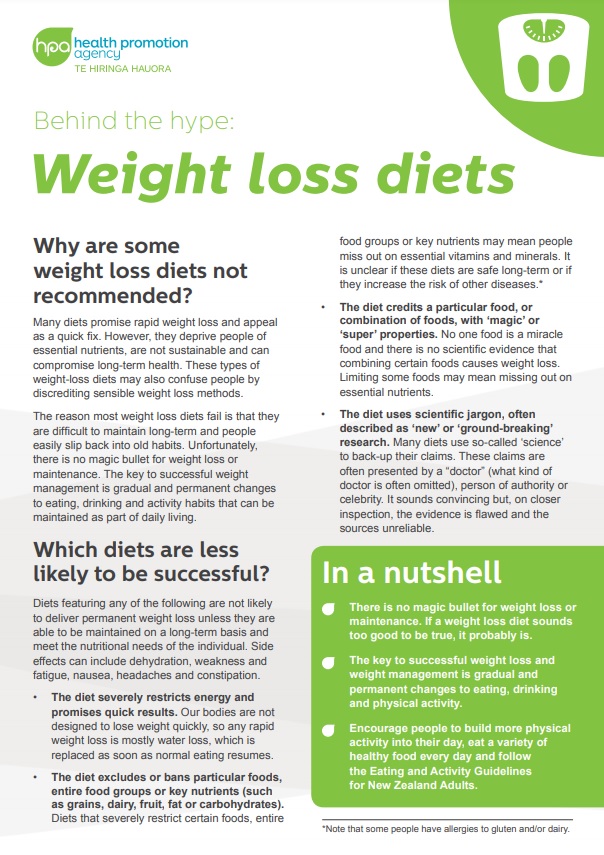If you're a frequent visitor to Healthify, why not share our site with a friend? Don't forget you can also browse Healthify without using your phone data.
Common questions about weight loss medicines
Key points about weight loss medicines
- Weight loss medicines may be recommended to help support weight loss when lifestyle changes such as a healthy diet and increasing exercise are not helping on their own.
- There are several weight loss medicines available in Aotearoa New Zealand.
- You should only use a weight loss medicine if your healthcare provider recommends it for you based on your individual health needs.
- Find out more about them, what to consider and the possible side effects.

Weight loss medicines may be recommended to help support weight loss and weight maintenance when lifestyle changes such as a healthy diet, improving sleep habits and exercise are not helping on their own. Weight loss medicines are not a ‘quick fix’, but can be a long term option for managing weight when combined with healthy eating and regular exercise. Read more about the importance of lifestyle changes when taking weight loss medicines.
You should only use a weight loss medicine if your healthcare provider recommends them for you based on your individual health needs.
Weight loss medicines available in Aotearoa New Zealand
There are a several weight loss medicines available in Aotearoa New Zealand. Each works in different ways, has different side effects and the cost may differ too. Your healthcare provider will discuss the various options with you.
- Contrave (naltrexone/buproprion)
- Duromine (phentermine)
- Saxenda (liraglutide)
- Xenical (orlistat)
- Wegovy (semaglutide)
Note: Ozempic® (semaglutide) is currently not marketed in New Zealand.
What are the criteria for being prescribed a weight loss medicine?
You’ll only be prescribed a weight loss medicine by a health professional if you meet certain criteria based on your body mass index (BMI) and any other health conditions you may have.
Your BMI is an estimate of your body size and is calculated using your height and weight. Learn more about BMI.
A weight loss medicines may be considered if:
- you have a BMI of 30 or more and have tried lifestyle changes for at least 6 months without successful weight loss, or
- you have a BMI of 27 or more and have at least 1 weight-related health problem, such as diabetes, pre-diabetes, high blood pressure, high cholesterol or obstructive sleep apnoea.
Note: Your healthcare provider will also consider if the medicine is safe for you based on your age, other health conditions you may have and any other medicines you're taking.
If your weight is affecting your health and day-to-day life, and you've tried various lifestyle changes to manage your weight, your healthcare provider may recommend a weight loss medicine.
Your healthcare provider will work with you to decide on the most suitable weight loss medicine for you. They will consider your health status, your age, other health conditions you may have and any other medicines you're taking. You might also like to consider the following.
How do the medicines work?
Weight loss medicines work in different ways and can affect your appetite, digestion, or metabolism. Different types of medicines may suit different people's needs. Some people may respond better to a certain type of weight loss medicine due to their individual needs, metabolism or lifestyle habits.
- Saxenda and Wegovy belong to a group of medicines called glucagon like peptide (GLP-1) receptor agonists. They mimic the GLP-1 hormone that is naturally produced in your gut after eating. These medicines reduce your appetite by making you feel more full and less hungry. This can lead to eating less food and therefore loss of weight. These medicines also stimulate the release of insulin from your pancreas and can help to control blood glucose levels.
- Contrave is a combination of 2 medicines – naltrexone and bupropion. These medicines work together in your brain to help reduce the signals that trigger the feeling of hunger. This means you can feel full with less food and have fewer food cravings when you're not hungry.
- Duromine is a stimulant medicine that works to suppress your appetite by directly affecting the area of your brain that controls your appetite, making you feel less hungry. It may only be suitable for short term use.
- Xenical works on an enzyme in your gut called pancreatic lipase, which reduces fat absorption in your gut by about 30%. It needs to be taken with a low-fat diet. Eating a meal that has a lot of fat may increase your risk of side effects.
How well do the medicines work?
Weight loss medicines differ in how much weight loss they can help you with. It may also depend on the dose of the medicine that works best for you without getting side effects. At one year, some medicines may support around 5% weight loss and others may support around 15%, however the response to the medicine varies between people. It's also important for other areas of your health to be monitored including your waist measurement, cholesterol levels, blood pressure, nutrient levels and overall health.
Your healthcare provider will monitor your weight loss over the first 6 months and then on an ongoing basis to determine if it's the right option for you and how long you'll need to keep taking it.
Safety and side effects
Weight loss medicines, like all medicines, have a wide range of side effects. Common side effects may include nausea, feeling overfull, constipation and diarrhoea. Some side effects can be serious or even dangerous, especially for people with certain health conditions, such as heart disease, high blood pressure or psychiatric conditions. The risk of side effects may also depend on other medicines you're taking. If side effects are unpleasant people may stop taking the medication early, or miss doses, reducing its effectiveness.
Ask your healthcare provider to explain possible side effects to help you make a safe choice when choosing a weight loss medicine.
Is the medicine available as an injection or tablets?
Saxenda and Wegovy are taken as an injection under the skin in areas such as your stomach, thigh or upper arm. Saxenda is taken as daily injection, while Wegovy is taken as weekly injection. Xenical, Duromine and Contrave are taken as tablets or capsules.
Cost
Weight loss medicines are not funded or subsidised in Aotearoa New Zealand, which means you'll have to pay for them yourself. They vary in price, costing between $100 to $500 per month. Most people are on these medicines long term, so the expense adds up quickly. Ask your healthcare provider how much they are likely to cost before you start your course.
Age
Weight loss medicines can generally be used in adults aged 18 years and older, but some weight loss medicines can be prescribed to people over 12 years of age. It's important to discuss the benefit versus the risks with your healthcare provider and to review the goals of the treatment.
The effects of weight-loss medicines are not permanent
When you stop taking weight-loss medicines, most people will gradually regain some or all of the weight lost. However, having healthy lifestyle may help to prevent or reduce weight regain. Also, healthy eating and physical activity offer important additional benefits, supporting your overall health and well-being.
The effects of weight-loss medicines are not permanent. When you stop taking them, most people will regain some or all of the weight lost over time. However, keeping a healthy lifestyle may help to prevent or reduce weight regain.
A healthy eating pattern
- Everyone’s body is different and it's important to have a healthy eating pattern made up of a balanced and nutritious diet with whole foods that meets your daily energy, protein, dietary fibre, fluid and nutrient needs.
- If the medicine affects your appetite, your portions will become smaller. It’s best to work with a health professional such as a registered dietitian, to ensure that you're getting what your body needs with less food, because your nutrient needs will change.
- It's also important that you can keep up this way of eating over the long term, rather than a choosing a restrictive or quick fix diet.
Regular exercise
- At least 2.5 hours of moderate physical activity per week should be included in everyone's routine due to the health benefits.
- Exercise also helps to increase muscle mass and improve fitness, heart health and mental health.
- Include muscle strengthening activities 2 or more days of each week to support muscle mass.
- Some physical activity is better than none – increasing physical activity of any kind is beneficial. Read more about how to increase your activity levels.
Different people respond differently to weight loss medicines and your healthcare provider can help you decide whether using weight-loss treatment long term is suitable for you.
- Once you've started treatment with a weight loss medicine, your healthcare provider will monitor you on a regular basis for side effects and your response to treatment.
- Usually, people who lose weight after 12 to 16 weeks of treatment continue to lose weight at 1 year and beyond.
- For people who are overweight or obese, a lasting weight loss of 5 to 10% can have important health benefits such as lower blood pressure, blood glucose and triglyceride levels.
- If you're not managing to lose enough weight (eg, your weight loss is less than 5% after 3 to 4 months) the medicine should be stopped, as the long-term benefits are likely to be outweighed by the risks and costs.
Yes, there are medicines that shouldn't be used for weight loss. These include:
- Laxatives: Any weight lost by using laxatives is short term, due to fluid or water loss. This is harmful as it can lead to serious problems, such as dehydration and salt (electrolyte) disturbances, and in some cases dependence.
- Thyroid hormones: Thyroid hormones (eg, Eltroxin) are not appropriate for losing weight unless the weight gain was caused by an underactive thyroid (hypothyroidism).
- Weight loss supplements: There are a number of non-prescription weight loss supplements and herbal remedies that promise easy weight loss, however, there is no evidence any of these products are effective.
- Other: The use of diuretics, chorionic gonadotrophin, or amphetamines is not appropriate for losing weight.
Evidence that weight loss medicines directly improve fertility is lacking.
Being overweight can reduce fertility in men and women.
- For women, being overweight impacts on fertility by causing hormonal imbalances, problems with ovulation and period problems. It's also associated with PCOS, a common cause of low fertility or infertility.
- For men, fertility may be reduced by extra weight leading to hormonal imbalances, issues with sperm quality and erection problems.
Overall, even a small amount of weight loss can improve fertility and pregnancy health. You have a greater chance of getting pregnant and having a healthy baby if you are close to a healthy weight. Weight loss in men who are overweight or obese can improve their total sperm count and quality.
Note: Weight loss medicines are generally not safe to take during pregnancy and when breastfeeding, so family planning should be discussed with your prescriber.
Weight loss – a healthy approach
FAQs about body mass index (BMI)
Contrave (naltrexone/buproprion)
Duromine (phentermine)
Saxenda (liraglutide)
Xenical (orlistat)
Wegovy (semaglutide)
Brochures
Healthy eating, active living(external link) HealthEd, NZ, 2020
Behind the hype – weight loss diets(external link) Health Ed and Health Promotion Agency, NZ, 2019
5 questions to ask about your medications(external link) Health Quality and Safety Commission, NZ, 2019 English(external link), te reo Māori(external link)
Apps/tools
References
- Obesity and weight-loss management(external link) Research Review, NZ, 2020
- Weight loss – the options and the evidence(external link) BPAC, NZ, 2022
- Clinical guidelines for weight management of New Zealand adults(external link) Ministry of Health, NZ, 2017
- Contrave(external link) Medsafe datasheet, NZ
- Pavli P, Triantafyllidou O, Kapantais E, et al. Infertility improvement after medical weight loss in women and men – a review of the literature(external link) Int J Mol Sci. 2024;25(3):1909
- Mozaffarian D, Agarwal M, Aggarwal M, et al. Nutritional priorities to support GLP-1 therapy for obesity – a joint advisory from the American College of Lifestyle Medicine, the American Society for Nutrition, the Obesity Medicine Association, and The Obesity Society(external link) Obesity (Silver Spring). 2025 May 30
- Contrave(external link) Medsafe Consumer Information Sheet, NZ
- Duromine(external link) Medsafe Consumer Information Sheet, NZ
- Saxenda(external link) Medsafe Consumer Information Sheet, NZ
- Xenical(external link) Medsafe Consumer Information Sheet, NZ
- Wegovy(external link) Medsafe Consumer Information Sheet, NZ
Brochures

HealthEd, NZ, 2020

Health Ed and Health Promotion Agency, NZ, 2022

Medicines and side effects
Healthify He Puna Waiora, NZ, 2024
Credits: Sandra Ponen, Pharmacist, Healthify He Puna Waiora. Healthify is brought to you by Health Navigator Charitable Trust.
Reviewed by: Lily Henderson, Registered Dietitian
Last reviewed:





